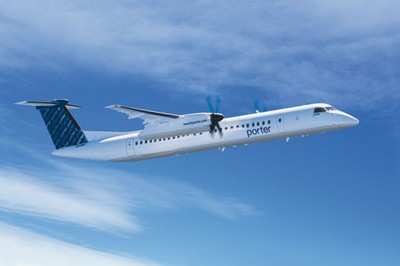Jim Hall Says ATR 42, Q400 Have Inherent Risks In Icing
 Even as the National Transportation
Safety Board continues its investigation into the downing of
Continental Connection Flight 3407 near Buffalo, NY -- and
investigators take pains to note it's too soon to draw any
conclusions about what caused the fatal crash -- a former head of
the NTSB says all twin-engine turboprop airliners should be
grounded immediately.
Even as the National Transportation
Safety Board continues its investigation into the downing of
Continental Connection Flight 3407 near Buffalo, NY -- and
investigators take pains to note it's too soon to draw any
conclusions about what caused the fatal crash -- a former head of
the NTSB says all twin-engine turboprop airliners should be
grounded immediately.
The Toronto Star reports Jim Hall -- who was appointed by
then-President Clinton to head up NTSB in 1994, and left in 2001 --
believes turboprop airliners like the ATR 42 and 72, and the
Bombardier Q400, may suffer from inherent safety issues in icing
conditions due to their relatively slow speeds, and the nature of
their deicing systems.
Specifically, Hall (right) notes turboprop regional aircraft fly
at slower airspeeds than turbofan-powered aircraft,
which may allow more time for ice to accumulate. And Hall
doesn't like the pneumatic boots those planes use to shed ice from
lifting surfaces.
"I think the prudent thing to do ... is ground the aircraft," he
said.
As ANN reported, a Q400 operated by Colgan Air
for Continental Airlines crashed into a home in Clarence Center, NY
the night of February 12, killing all 49 people onboard the
airliner and one of the three people inside the home. Evidence
suggests the airliner came down after experiencing an aerodynamic
stall at low altitude, possibly tied to significant icing
conditions noted by the flight crew during the initial descent.
The Star notes Hall's recommendation would cause "havoc" if
implemented, stranding tens of thousands of passengers flying on
routes now served by regional turboprops. FAA spokesperson Laura
Brown told the paper she sees little chance of that happening.
"We don't have any data right now that would lead us to ground
this aircraft," Brown said. "The FAA and the whole aviation
industry has worked aggressively over the past 15 years to reduce
accidents related to icing and those accidents have dropped
significantly as a result of that work.
"The aircraft involved in the crash has a sophisticated ice
detection and protection system that benefited from years of
research and analysis about how aircraft operate and perform in icy
conditions," Brown added.
Robert Deluce is president and CEO of Toronto-based Porter
Airlines, which flies Q400s exclusively. Needless to say, he's less
that thrilled about Hall's comments, and about the negative
attention the Q400 has garnered over the past six days.

"If (the safety board) had any concerns, or if the FAA or
Transport Canada or Bombardier had any concerns about the aircraft,
of any kind, it would have been grounded by now," Deluce said. "But
this does not sound like anything related to the aircraft. This
sounds like it is related to some other issues that have yet to
come out."
Hall maintains his concern isn't with Bombardier... but with
questions regarding certification standards for turboprop aircraft
in certain flight conditions. Moreover, Hall notes he has
experience with that; namely, the 1994 icing-relation crash of
American Eagle Flight 4184 over Roselawn, IN, which investigators
attributed to a previously unforeseen problem with the coverage
area of that type's wing deicing boots.
"I have a great deal of respect for the Canadian aviation safety
system as well as the manufacturer of this particular aircraft,"
Hall said. "My concern is with the failure in the certification
process in the United States in light of accidents involving
aircrafts similarly designed, which was the ATR-72."
Bombardier spokesman John Arnone responded to Hall's comments by
pointing out that worldwide, Q400s have logged over one million
flight hours. "The tragic crash near Buffalo represented the first
fatalities in a Q400 aircraft," he said.
As for Hall's recommendation for turboprop airliners to be
grounded, Arnone said "frankly it doesn't change our priority as a
company right now."

Since leaving the NTSB, Hall founded a consulting firm
specializing in "legislative affairs, crisis management, and
transportation safety and security," according to his Web site.
Hall is also a partner with the Nolan Law Group, a law firm
specializing in aviation-related lawsuits.
 ANN's Daily Aero-Linx (05.06.25)
ANN's Daily Aero-Linx (05.06.25) ANN's Daily Aero-Term (05.06.25): Ultrahigh Frequency (UHF)
ANN's Daily Aero-Term (05.06.25): Ultrahigh Frequency (UHF) ANN FAQ: Q&A 101
ANN FAQ: Q&A 101 Classic Aero-TV: Virtual Reality Painting--PPG Leverages Technology for Training
Classic Aero-TV: Virtual Reality Painting--PPG Leverages Technology for Training Airborne 05.02.25: Joby Crewed Milestone, Diamond Club, Canadian Pilot Insurance
Airborne 05.02.25: Joby Crewed Milestone, Diamond Club, Canadian Pilot Insurance





